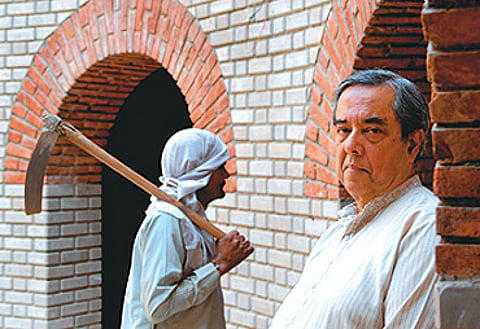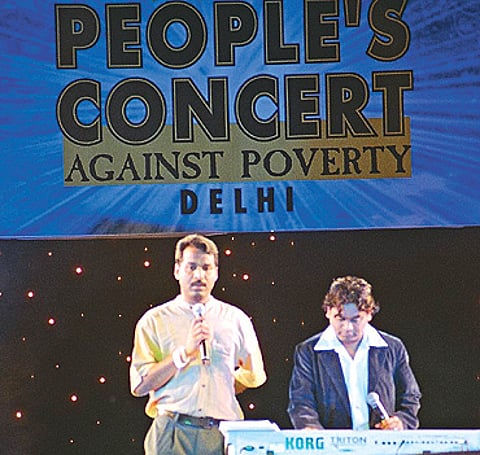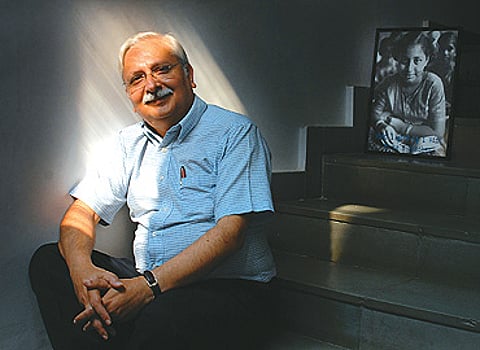The Dandi Diaspora
Cause and effect. Indian expertise in civil society problems gives them a global edge.
- Indians have a better, first-hand experience of poverty. And also richer experience in combating it.
- Excellent at mobilising masses, in contrast to those in the west who are good only at lobbying.
- Indians groomed in the Gandhian tradition of working for the forgotten people and organising citizens for peaceful protests.
- India provides a democratic space for experimentation, in an environment not suppressive of innovative ideas. It helps produce well-trained leaders.
***

Invisible to an uncaring media, these Indians have been stepping ahead in parallel with Indians taking space around the top in other fields; the many writers, businessmen like Laxmi Mittal. Now Ashok Khosla from the NGO Development Alternatives has come to head the IUCN (International Union for Conservation of Nature), the world's biggest environmental grouping that carries out research and field projects around the world, bringing together more than a thousand government and independent organisations. Then there's Dalip Mukarji, a doctor who worked at a leprosy centre in Andhra Pradesh and now heads Christian Aid, one of the largest charities in the world, supporting hundreds of millions of people. Ingrid Srinath heads Civicus, a hugely influential network of civil society groups around the world. John Samuel is international director of ActionAid.
These are not just Indians who happen to be there; they are there because they happen to be Indians. "In relation to social justice and poverty eradication questions, nobody can talk with greater legitimacy than an Indian," says Shetty. "We have both the largest number of poor people in the world and some of the most effective interventions to combat it. Take the Right to Information or Right to Food campaigns; they are at the leading edge of civil society action to combat poverty and discrimination."
In some ways, India has its problems working for it. Ingrid Srinath says, "The exposure to both, deep, structural injustices of the kind prevalent in India, and the multiplicity of successful civil society interventions there, makes it possible to relate to injustice and marginalisation around the world and to retain a sense of optimism and constructive engagement even in situations that seem utterly dire."

Indeed, India has a way of getting a lot of people together to make a lot of informed noise, then demand change—and achieve it as well. "People in the European Union and the United States are good at lobbying, not mobilising," says John Samuel. "In the West, advocacy meant experts hanging around in the corridors of power, and media-driven campaigns. In the last 10 years, global advocacy has been informed by India, Brazil and South Africa."
For instance, the mass protests over world trade talks apparently had a very Indian root. "The trade justice campaign arose from a workshop I did," says Samuel. This was some time before the explosive trade talks in Seattle 1999, when widespread rioting broke out against big corporations linking arms with rich governments to force deals profitable for them, but disastrous to too many others.
The protests were firstly a communication triumph. They began with a translation job, in decoding a negotiating language that was choking on jargon. "Civil society demystified the whole trade justice negotiations," says Samuel. "These highly technical agreements were brought to the people and ordinary political leaders." From conference rooms the discourse spilled on to the streets, and then flowed back to inform the negotiations. It sparked off a people's action that backed the likes of Kamal Nath in blocking an advance of EU and US business into markets like India that could have smothered much of local produce, and producers. In step with civil society, political positions by India, Brazil, South Africa and some others broke that Western habit that advanced nations must also be advancing nations, now into markets if not whole countries. No trade deal is better than a bad deal, civil society argued successfully. The lack of a wto agreement on this could well turn out to be one of history's more progressive indecisions.
Dr Rajanikant Shankarrao Arole and Mabelle Rajanikant Arole pioneered a system of preventive medication in hopeless situations in Maharashtra; the World Health Organisation picked that up and promoted it in other countries. Ela Bhatt's Self-Employed Women's Association (SEWA) has become a model in scores of countries. Anil Aggarwal's work on clean air long preceded the follow-up later on steps to limit climate change, and his techniques for decentralised water management are now integral to local water management in villages. Rajesh Tandon's models for what he called participatory research have been adopted as almost standard in work among the disadvantaged.

Tandon, who began with an engineering degree from IIT Kanpur followed by an MBA at IIM Calcutta and a PhD in the US, abandoned managerial ambitions to work in Indian villages. "I saw a disconnect between quantitative, instrumental knowledge and local views of knowledge that were more intuitive, emotive, practical, experiential," he says. "That disconnect began to bother me. The knowledge system of the expert was undermining the more rooted knowledge system." And so he developed methodologies to blend the two, such as developing a literacy primer for specific groups of village women arising from their world and the daily issues they deal with. At the many international conferences on development in the '90s, starting with the Earth Summit in Rio in 1992, these ideas were rapidly, and widely picked up.
At least one simple reason that India has produced so many ideas for the world is that you name the problem, and we have it. But more because, says Tandon, "there is a democratic space available for experimentation, in an environment that is not suppressive, that is liberating in some way". And, talking Gandhi again, "India has a long tradition of people with all sorts of education and training coming to serve society", he adds.
They have worked to develop a new democracy that goes beyond a vote every five years or so; it's a continuing campaign to give disregarded choices a chance and the dispossessed a voice, but by producing the doable and deliverable. And when you have that, you don't petition a government with problems; you confront it with solutions.
Tags